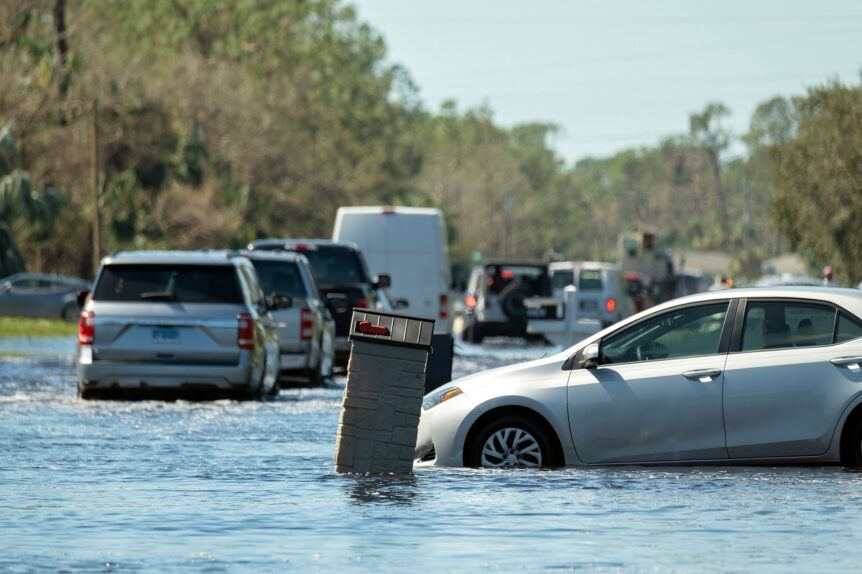As of today, Hurricane Milton has been upgraded to a Category 5 storm, with meteorologists predicting significant impacts along the southeastern U.S. coastline. The storm, currently swirling in the Atlantic, is moving northwest with sustained winds reaching up to 140 mph, and is expected to make landfall within the next 48 hours. Residents of Florida, Georgia, and parts of the Carolinas are being urged to take precautions, as forecasters warn of life-threatening storm surges, torrential rain, and the potential for widespread flooding.
Path and Impact Zones
Hurricane Milton’s projected path places it in the trajectory of some of the most densely populated coastal areas. The National Hurricane Center (NHC) predicts landfall around northern Florida or southern Georgia, with the storm then potentially moving inland, weakening but still bringing dangerous conditions to the Carolinas. Mandatory evacuation orders have been issued for some coastal areas, particularly those at risk of storm surges exceeding 12 feet.
While the exact point of landfall is still uncertain, the cone of uncertainty extends along the entire southeastern coastline, meaning that all residents in the region should remain on high alert. The storm’s outer bands are expected to begin impacting the coast by this evening, bringing high winds and heavy rain ahead of the eye of the storm.
Government Response and Preparedness
State and local governments are urging residents to heed evacuation orders and take steps to secure their homes. Florida Governor Ron DeSantis declared a state of emergency earlier this week, ensuring that state and federal resources are available for disaster relief efforts. “Our priority is ensuring the safety of everyone in the storm’s path. If you’re in an evacuation zone, now is the time to leave,” DeSantis said in a press briefing.
In Georgia, Governor Brian Kemp has mobilized the National Guard, with troops ready to assist in both evacuations and post-storm recovery efforts. Hospitals in the coastal regions have begun transferring patients to inland facilities, and shelters have been opened to accommodate displaced residents. Emergency services are preparing for the possibility of power outages and communication disruptions in the wake of the hurricane.
Potential for Severe Flooding
One of the most significant concerns with Hurricane Milton is the potential for widespread flooding. The National Weather Service (NWS) is predicting rainfall amounts between 10 to 15 inches, with isolated areas seeing up to 20 inches. Urban flooding is likely in cities such as Jacksonville, Savannah, and Charleston, where drainage systems could quickly become overwhelmed by the deluge.
Inland areas are also at risk of flooding as the storm moves northward. The combination of heavy rainfall and already saturated ground from previous storms could lead to rivers breaching their banks and flash flooding in low-lying areas.
Storm Surge and Coastal Erosion
The NHC has issued storm surge warnings for coastal regions, with the potential for life-threatening surges expected. Areas along the Gulf Coast and Atlantic coastline are especially vulnerable to storm surge inundation, which could cause significant damage to homes and infrastructure. The storm’s high winds are also expected to contribute to coastal erosion, with beaches in parts of Florida and Georgia likely to experience substantial damage.
Airlines and Transportation
Major airlines have already begun canceling flights in and out of airports across the southeast, including Miami, Orlando, Savannah, and Charleston. Amtrak has also suspended some services in the region, and residents in affected areas are being advised to avoid unnecessary travel. The Department of Transportation is working to ensure major evacuation routes remain open, but with heavy traffic reported on highways leading inland, delays are expected.
Community Response
In preparation for the hurricane, local communities are coming together to offer assistance to those who may be unable to evacuate. Volunteer groups have been setting up transportation for elderly residents, while local churches and community centers are opening their doors to provide temporary shelter for those in need.
“We’re doing everything we can to help people get out safely,” said a volunteer in Savannah, who has been working with local nonprofits to assist in the evacuation process. “It’s a stressful time, but the community is really pulling together to make sure no one is left behind.”
Looking Ahead
While it’s too early to predict the full extent of Hurricane Milton’s impact, forecasters are warning that this storm could be one of the most severe of the season. Residents are urged to monitor local news and weather updates closely and to follow instructions from local authorities. Emergency services remain on high alert, with the expectation that the storm will bring widespread power outages, infrastructure damage, and a potentially lengthy recovery period in the hardest-hit areas.
With the storm still intensifying as it approaches the coast, today’s focus remains on preparing for the worst while hoping for the best.
Photo Credit: Shutterstock/ Bilanol


